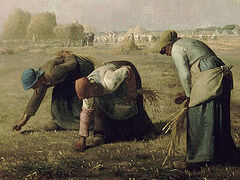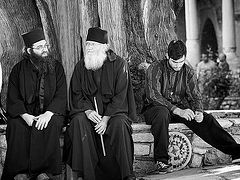In Vigla,1 not far from the sea, in the forest surrounding the Romanian skete of Prodromos, you can find ascetic hermits living the spiritual life in prayer. A small vegetable patch, a spring and a cell with an old dilapidated roof are the only possessions of the hesychast. At first glance, this is not much. And it is only while talking to him that you understand what treasures he preserves in his soul. Fr. Vlasie, a Cypriot monk from Vigla, is a possessor of such spiritual treasures.
—Fr. Vlasie, can the Holy Spirit change the path of a person’s life? Can the grace of God overcome the human weaknesses embedded in his inheritance?
—Man, especially in his state after the Fall, cannot be higher than his nature, but the Holy Spirit helps him overpower the natural man in him. Divine grace overcomes everything. The passions did not exist before the Fall of Man. And after the Fall, only the Spirit of God can give us the strength to struggle with the passions and conquer them. They belong to the realm of evil.
—And how can we overcome the negative things inherited from our parents?
—If we speak about the soul’s evil inclinations toward unbelief, egotism, then they belong to our fallen nature and not to our parents. We all have inherited “unnatural” things that are alien to the good nature God planted in us. After the Fall, man became absolutely powerless in comparison to his primordial state. He lost the original boldness that had allowed him to converse with God face-to-face, and the beauty of his soul was no longer the same as before. Cain murdered his brother Abel. Everything was getting worse…
Baptism and faith in Christ restore man’s original state
However, even today a person can gain the power for the victory over sin by being baptized and believing in Christ. He that believeth and is baptized shall be saved; but he that believeth not shall be damned (Mk. 16:16).
What does faith in God exist for? Faith in God is the rectification of our forefathers’ mistakes. From the moment Adam believed the words of the devil, who said, Ye shall not surely die: For God doth know that in the day ye eat thereof, then your eyes shall be opened, and ye shall be as gods, knowing good and evil (Gen. 3:4-5), he began to believe lies and not the truth. It was necessary for Christ to come to save us from this lack of belief in God, in His Word by means of faith in Him. Christ fixed Adam’s unbelief, so he who believes in Christ is saved. No one can be saved without faith in Christ.
Keeping the commandments delivers the soul from despondency2
—How can we rid ourselves of the state of idleness and melancholy that often takes hold of us?
—As Christ the Savior says in the Gospel: The Kingdom of Heaven suffereth violence, and the violent take it by force (Mt. 11:12). Efforts should be directed towards three things: prayer, fulfilling the commandments of the Church and partaking in Christ’s Mysteries. Prayer gives strength to the soul, and the most important of the Holy Mysteries are Confession and Communion of the Body of Christ.
Many come to me and ask, “How can we protect ourselves from sin if we live in the world?” And I would answer them, “You should observe three things: frequent confession, communing of the Body and Blood of Christ and thorough study of the Holy Scriptures.” These, coupled with prayer and observance of the rules of the Church, lead to not being bothered by temptations. Even if they come, they cannot strike him, and fall to his feet helplessly, because there is humility in the confession of sins, and humility attracts grace.
He who thinks that he doesn’t need a spiritual father is an egoist. Saints who attained a high spiritual level, such as Sts. Onuphrius the Great and Peter of Mt. Athos, were exceptions. They greatly exceeded the usual level. In contrast, St. Mary of Egypt needed Confession and Communion, even if only once. An though God’s grace rested upon her, and though she could float a cubit [an ancient measure of length equal to eighteen inches.—Trans.] above the ground during prayer, and could cross the Jordan as if on dry land, she nevertheless needed that last seal in her life.
Doubt makes us good for nothing
—If doubts come to your mind to disrupt what you want to do, how can we figure out whether these thoughts are good or have come from the evil one?
—There are changes that take place in the human soul as it moves toward God. Thoughts cast doubt on these changes and they are blocked.
—Do you mean doubt in faith?
—Not necessarily, but thoughts will speak to you, as if you were walking in the wrong direction. When the devil brings anxiety into your soul, he rejoices that he has managed to do something to you. St. John the Evangelist says that when we obey the Word of God, our conscience testifies to us that we are on the right path (cf. 1 Jn. 2:5). Once doubt has crept in, it makes us lukewarm, nips our zeal in the bud, so that we become good for nothing.
We should pray to God daily for the strength to keep His commandments. All the good that comes into our souls is from God. It is His work and not that of the person. When Adam and Eve sinned, they saw that they were naked. God asked them, Who told thee that thou wast naked? (Gen. 3:11). The lack of grace made itself known. The same happens to everyone. Once grace leaves, a person stops feeling well. And when he tastes grace and then loses it, his state can be even worse than it was before he received it.
—But we barely feel grace. We are sinners…
—Grace comes to a person in accordance with his faith and the zeal he puts into obeying the God’s commandments. We have the example of St. Joseph the Hesychast. He strove to acquire grace his entire life and struggled much to receive this gift. If we ask for grace as zealously as he did, we will receive it.
—What influence does the work of the evil one have on man?
—It depends on his life. If he lives a pure life, keeping the commandments and taking Communion regularly, the evil one can’t harm him. However, if he commits sins or if he is lukewarm, the devil can affect his soul. But the work of demonic powers also disturbs spiritual people. Even so, the enemy cannot overpower the good aspirations of a believer.
A young man visited me recently. When he was here the previous time, he told me that a girl was trying to cast spells on him so he would marry her. I told him that if he went to confession regularly and kept to the way of the Church, the evil spirit would not be able to prevail. And now, a year later, we have met again. He said that whenever he follows this spiritual rule—prayer, Confession and Communion—temptations do come, but they are powerless to change his state of mind. The power of God that springs up in his soul covers him and helps him persevere against the passions.
The unseen warfare of the thoughts
—How can we get rid of impure thoughts that suddenly attack the mind? Should we do any specific penance to prevent them from recurring?
—When we don’t know if one or another thought is from God or from the enemy, we should turn to Christ in prayer so as to get rid of the turmoil in our mind. Let us say, “O Lord, drive away this work of the enemy from my mind!” And when we know for sure that these are sinful thoughts, we should not attach importance to them. Elder Paisios the Hagiorite said the following about this, “Evil thoughts are like airplanes looking for airports. They are flying, but they must not land.3” Like the seed of a weed, if you don’t allow it to fall on the earth of your soul, it can’t bear fruit. But if it has germinated, and you pour more water on it, it will take root.
The same can be said about thoughts in our mind. If we brood over them, they gain power over our souls and direct our being towards themselves. This is how sin is born. This is why we must face evil thoughts in time. Otherwise a little spark will set the whole forest on fire.
It is mind-boggling to what degree we Christians can be tempted by the passions and evil thoughts. We inherit the fallen nature of the first-created people, and that’s why our struggle can be so difficult.
We can attain pure thoughts by prayer
—How can we avoid judging others?
—Let’s keep in mind the word of the Lord, that says: Judge not, that ye be not judged (Mt. 7:1). Always know that if someone judges someone while talking with you, he well may judge you, his friend, in front of others. So, whenever a person judges someone, we should not participate.
—How can we learn to look at every human being as our brother and as Christ?
—There are two types of judgment: one is external and made verbally, and the other is secret and is felt only in the soul. In my understanding, we can only attain pure thoughts through prayer. Constant self-deprecation, or self-criticism, can bring us to look differently at those around us because we were given eyes to see not only the passions, but also the weaknesses of our neighbor.
If there were love in a person, he would be able to look at others the way he looks at God. But there is some subtle passion, jealousy, which hinders his seeing clearly. St. Paul says that when we see our neighbor in virtue, we must rejoice, because we are the members of one body. If, on the other hand, we see something bad, we must grieve instead of judging our neighbor, otherwise we wound ourselves (cf. 1 Cor. 12:26). But we have no awareness that we are all brothers and members of one body. We don’t suffer and don’t feel the pain of our neighbor.
—What are the temptations of a person whose monastic struggle is in solitude?
—Judging by my very modest experience, I can say that warfare against the thoughts that come from the devil is the most difficult of all. All the desert fathers watched for temptations “from the right.” As a monk, you realize that it isn’t so easy to yield to temptations “from the left” (smoking, drinking, lust) because you practice an ascetic life that doesn’t allow you to do so. But temptations “from the right” can get the upper hand over you if you are careless. They are like a fishhook: once it seizes you, it’s hard to pull it out.
Obedience draws down grace into the soul
I heard about one case that took place seventy years ago. One monk, having learned that an old acquaintance of his had fallen into the sin of fornication and ended up in a brothel in Athens decided to go and speak to her, believing that he could set her straight. Before acting on his plan, he turned to a famous elder, the Venerable Ieronymos (Jerome) of Aegina, for advice. The elder received him and gave him the following advice, “Don’t go to Athens! Offer up special prayers for her, but at a distance. It won’t do you any good if you go there! Don’t draw near to her!” The monk answered, “I have known her since she was a child. I don’t think something bad will happen. I will have enough strength to overcome sin.” Elder Ieronymos insisted, “You can do a penance for her, as severe as you wish, for months or years, but don’t go there! And God, seeing your love, will give her a chance to repent and convert. May He bless you!”
After receiving his blessing, the monk left. He travelled to Athens, and struggling with his thoughts, was tempted to see her. He kept saying to himself, “Nothing bad can happen.” When he met with the woman, they began discussing questions of faith. She told him she knew the Church’s commandments. And then the unforeseen happened—they fell into sin.
On returning to his Aegean father-confessor in shame, the monk was given a most severe penance: he was forbidden to receive Communion for ten years. Elder Ieronymos told him, “Five years for disobedience to the spiritual father’s words and five years for fornication.” That monk shed many tears and spent the rest of his life in true repentance.
What am I driving at? We should be very attentive, because the devil attacks ascetics primarily via their thoughts. First, you have no idea in what direction one or another thought may lead you, and what temptation may be hidden within it. Obedience is the greatest deed, while disobedience is arrogance and egotism. Arrogance drives away grace. When you take no one’s advice and oppose the word of God that is revealed through someone, or through the Holy Scriptures, you will pay for this by falling.
After grace had brought that monk to Elder Ieronymos and revealed God’s will to him, the devil still tempted him, and he fell. The monk didn’t heed the elder’s advice, and he lost grace and the purity of his soul.
—What’s the spiritual state of the faithful in Greece nowadays?
—Unfortunately, very few people in Greece go to confession. On Pascha and the Nativity of Christ many come up to the holy chalice without confession. They say, “I’m a Christian and I should receive the Body of Christ,” without realizing that they should prepare for this.
—How should a priest answer someone who comes to confession with grave sins?
—Priests have the Pedalion4, and they can judge by the canons. Although today it’s impossible to impose the penances that were imposed in the earliest times, such people shouldn’t walk away from the priest without a penance. If you see someone’s deep and sincere remorse, you can lighten the penance; but if there is no repentance in his soul, you can assign him the penance that was originally given by the Holy Fathers.
I knew a priest who imposed penances strictly according to canon law. Fornication meant a prohibition on receiving Communion for six or eight years, and witchcraft, for twenty years as witchcraft is collaboration with the devil. Many believed him to be mad. Eventually someone denounced him to the bishop. The bishop investigated his case and told him, “They say you are as hard as an axe!” But the priest replied, “I don’t even impose half of the penance that the Holy Fathers used to impose. If someone has filed a complaint against me, call the person who reported me. I will accept the Church’s verdict.”
A woman came to the bishop, and he said to her, “I gave this priest the authority to remit sins. Tell me what you did and what you are complaining about, and I will grant you absolution.” When the woman confessed her sins to the hierarch, he replied reproachfully, “In my opinion, you should carry out a penance three times greater than the one you’ve received.” Ashamed, the woman returned to the priest, tearfully begging his forgiveness and saying that some wicked people had convinced her to file the complaint.




